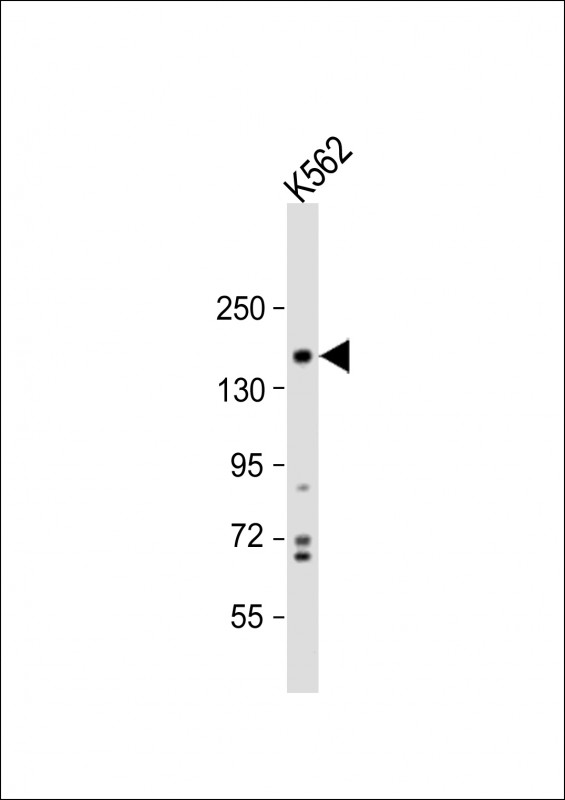PHLPP1 Antibody (N-term)
Purified Rabbit Polyclonal Antibody (Pab)
- 产品详情
- 实验流程
- 背景知识
Application
| WB, E |
|---|---|
| Primary Accession | O60346 |
| Other Accession | Q9WTR8, Q8CHE4 |
| Reactivity | Human |
| Predicted | Mouse, Rat |
| Host | Rabbit |
| Clonality | Polyclonal |
| Isotype | Rabbit IgG |
| Calculated MW | 184672 Da |
| Antigen Region | 531-560 aa |
| Gene ID | 23239 |
|---|---|
| Other Names | PH domain leucine-rich repeat-containing protein phosphatase 1, Pleckstrin homology domain-containing family E member 1, PH domain-containing family E member 1, Suprachiasmatic nucleus circadian oscillatory protein, hSCOP, PHLPP1, KIAA0606, PHLPP, PLEKHE1, SCOP |
| Target/Specificity | This PHLPP1 antibody is generated from rabbits immunized with a KLH conjugated synthetic peptide between 531-560 amino acids from the N-terminal region of human PHLPP1. |
| Dilution | WB~~1:1000 E~~Use at an assay dependent concentration. |
| Format | Purified polyclonal antibody supplied in PBS with 0.09% (W/V) sodium azide. This antibody is prepared by Saturated Ammonium Sulfate (SAS) precipitation followed by dialysis against PBS. |
| Storage | Maintain refrigerated at 2-8°C for up to 2 weeks. For long term storage store at -20°C in small aliquots to prevent freeze-thaw cycles. |
| Precautions | PHLPP1 Antibody (N-term) is for research use only and not for use in diagnostic or therapeutic procedures. |
| Name | PHLPP1 |
|---|---|
| Synonyms | KIAA0606, PHLPP, PLEKHE1, SCOP |
| Function | Protein phosphatase involved in regulation of Akt and PKC signaling. Mediates dephosphorylation in the C-terminal domain hydrophobic motif of members of the AGC Ser/Thr protein kinase family; specifically acts on 'Ser-473' of AKT2 and AKT3, 'Ser-660' of PRKCB and 'Ser-657' of PRKCA (PubMed:15808505, PubMed:17386267, PubMed:18162466). Isoform 2 seems to have a major role in regulating Akt signaling in hippocampal neurons (By similarity). Akt regulates the balance between cell survival and apoptosis through a cascade that primarily alters the function of transcription factors that regulate pro- and antiapoptotic genes. Dephosphorylation of 'Ser-473' of Akt triggers apoptosis and suppression of tumor growth. Dephosphorylation of PRKCA and PRKCB leads to their destabilization and degradation (PubMed:18162466). Dephosphorylates STK4 on 'Thr-387' leading to STK4 activation and apoptosis (PubMed:20513427). Dephosphorylates RPS6KB1 and is involved in regulation of cap-dependent translation (PubMed:21986499). Inhibits cancer cell proliferation and may act as a tumor suppressor (PubMed:19079341). Dephosphorylates RAF1 inhibiting its kinase activity (PubMed:24530606). May act as a negative regulator of K-Ras signaling in membrane rafts (By similarity). Involved in the hippocampus- dependent long-term memory formation (By similarity). Involved in circadian control by regulating the consolidation of circadian periodicity after resetting (By similarity). Involved in development and function of regulatory T-cells (By similarity). |
| Cellular Location | Cytoplasm. Membrane; Peripheral membrane protein. Nucleus. Note=In colorectal cancer tissue, expression is concentrated at the lateral membrane of epithelial cells |
| Tissue Location | In colorectal cancer tissue, expression is highest in the surface epithelium of normal colonic mucosa adjacent to the cancer tissue but is largely excluded from the crypt bases. Expression is lost or significantly decreased in 78% of tested tumors (at protein level). Ubiquitously expressed in non-cancerous tissues |
For Research Use Only. Not For Use In Diagnostic Procedures.
Provided below are standard protocols that you may find useful for product applications.
BACKGROUND
PHLPP1 is a protein phosphatase that specifically mediates dephosphorylation of 'Ser-473' of AKT1, a protein that regulates the balance between cell survival and apoptosis through a cascade that primarily alters the function of transcription factors that regulate pro- and antiapoptotic genes.
REFERENCES
Gao,T., J. Biol. Chem. 283 (10), 6300-6311 (2008)
Brognard,J., Mol. Cell 25 (6), 917-931 (2007)
Gao,T., Mol. Cell 18 (1), 13-24 (2005)
终于等到您。ABCEPTA(百远生物)抗体产品。
点击下方“我要评价 ”按钮提交您的反馈信息,您的反馈和评价是我们最宝贵的财富之一,
我们将在1-3个工作日内处理您的反馈信息。
如有疑问,联系:0512-88856768 tech-china@abcepta.com.























 癌症的基本特征包括细胞增殖、血管生成、迁移、凋亡逃避机制和细胞永生等。找到癌症发生过程中这些通路的关键标记物和对应的抗体用于检测至关重要。
癌症的基本特征包括细胞增殖、血管生成、迁移、凋亡逃避机制和细胞永生等。找到癌症发生过程中这些通路的关键标记物和对应的抗体用于检测至关重要。 为您推荐一个泛素化位点预测神器——泛素化分析工具,可以为您的蛋白的泛素化位点作出预测和评分。
为您推荐一个泛素化位点预测神器——泛素化分析工具,可以为您的蛋白的泛素化位点作出预测和评分。 细胞自噬受体图形绘图工具为你的蛋白的细胞受体结合位点作出预测和评分,识别结合到自噬通路中的蛋白是非常重要的,便于让我们理解自噬在正常生理、病理过程中的作用,如发育、细胞分化、神经退化性疾病、压力条件下、感染和癌症。
细胞自噬受体图形绘图工具为你的蛋白的细胞受体结合位点作出预测和评分,识别结合到自噬通路中的蛋白是非常重要的,便于让我们理解自噬在正常生理、病理过程中的作用,如发育、细胞分化、神经退化性疾病、压力条件下、感染和癌症。






